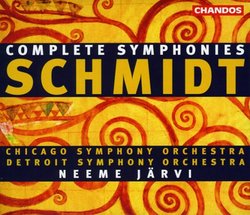| All Artists: Franz Schmidt, Neeme Järvi Title: Schmidt: Symphonies Nos. 1-4 Members Wishing: 1 Total Copies: 0 Label: Chandos Release Date: 10/21/1997 Genre: Classical Styles: Historical Periods, Modern, 20th, & 21st Century, Symphonies Number of Discs: 4 SwapaCD Credits: 4 UPC: 095115956823 |
Search - Franz Schmidt, Neeme Järvi :: Schmidt: Symphonies Nos. 1-4
 | Franz Schmidt, Neeme Järvi Schmidt: Symphonies Nos. 1-4 Genre: Classical
|
Larger Image |
CD Details |
CD ReviewsRich, rewarding music that deserves to be better known N. Daniele Pietro | Milano, MI Italy | 11/29/2000 (5 out of 5 stars) "Franz Schmidt's music is another discovery I owe to Michael Steinberg's priceless book "The Symphony", and it's surely one the most rewarding and durable ones. Schmidt was one of the composers (Strauss, Mahler, to name just the most famous) that formed their art in the melting pot that was Vienna in the first decades of the XX century. It was a background that has remained unique : it was the twilight of an Empire but , at the same time, one of the most culturally thriving times in history, in many fields, and Austria being Austria, music was one of the principal interests. While sharing with the above mentioned composers the predilection for opulently late-Romantic orchestrations, Schmidt had an innate penchant for the abstract, traditional symphonic form. Bruckner, that he much admired, was briefly his teacher, and it shows. Schmidt made no concessions to the flamboyant, sometimes bombastic form of the symphonic poem, nor to the anguished neurosis of Mahler's meandering symphonies, which he disliked. So, think about a grand Bruckner symphony but with Viennese Romantic charm instead of the mysticism, less brass, more strings and woodwinds , lush Straussian (or Korngoldian, if you prefer) orchestration , a good amount of severe Regerian counterpoint, and you'll get a rough idea of a Schmidt symphony. This may sound like a mixed bag or like dry, academic stuff, but instead Schmidt's works are entirely personal and well-integrated: they are full of personal ideas and wonderful ( may I dare to say catchy?) melodies, and his skills in the use of a big orchestra are splendid throughout. Also, Schmidt's is a real symphonic "cycle", because each one of the four symphonies has its own individual "personality" , showing very clearly the composer's evolution. The 1st is an affirmative work : still somewhat derivative from the models mentioned above (he was just 24) , but the talent for achitectural development, the real symphonist's mark, is already apparent throughout. It has, here and there, an intriguing taste for neo-Baroque figurations, but there's no heaviness à la Reger, the effusive, post-Romantic sweep is all Schmidt's. The 2nd is the most decadently rich of the four: it's lushly sweeping , with grandly shaped climaxes which inevitably remind the listener of Bruckner (a more sensual Bruckner, if you want) If you like to wallow in lavish sounds, you'll love it, personally I find it less cogent than the 1st. The 3rd is, in my opinion, a marvelous work: it's more gracefully Viennese than sumptuous, with a leaner, more sophisticated sound. The mood is overall lighter, the tunes are often charmingly poignant (the Adagio!), the final movement (a chorale introduction followed by a noble, dignified slow dance) is, in my opinion, among this composer's very finest things. The 4th, generally regarded as Schmidt's masterpiece, stands a bit apart from the others : the mood is way darker (it was inspired by Schmidt's grief for his daughter's death), and the form is unusually innovative. This complex, massive one-movement symphony blossoms from one instrument's solo, a stupendously haunting trumpet phrase which, through wonderfully inventive developments (among them, a stunning funeral march) leads us to the shatteringly percussive climax. Once more, music fans have to thank the Jarvi/Chandos partnership for their adventurous repertoire choices, and for recording them with top-notch orchestras. I found the playing uniformly accomplished and unexpectedly idiomatic throughout, especially considering that this is not exactly "standard" repertoire outside of Austria. If the live-recorded Chicagoans their special plus of virtuosity to the 2nd and the 3rd, the Detroit Symphony more than matches them in the 1st and 4th (I'd even say that they produce a more "Viennese" sound). Chandos's engineering is approriately warm, yet well-detailed, markedly fuller in the Detroit studio recordings, Among the (too few & hard-to-find) Schmidt cycles currently on the market, this is surely a best-buy, but if you can, also get the Gramophone Award-winner 4th by Franz Welser-Most on EMI, it's something special." MY OH MY! Ryan Kouroukis | Toronto, Ontario Canada | 11/07/2002 (5 out of 5 stars) "Schmidt studied with Bruckner for a few years and played cello under Mahler. His other famous work is "The Book with Seven Seals" Oratorio.
So many things happen when you listen to these four symphonies and there's no way that you will be dissapointed with this set (which is the only complete set). My only recommendation is to try to find it used because it will kill your wallet to buy it new!" |

 Track Listings (4) - Disc #1
Track Listings (4) - Disc #1